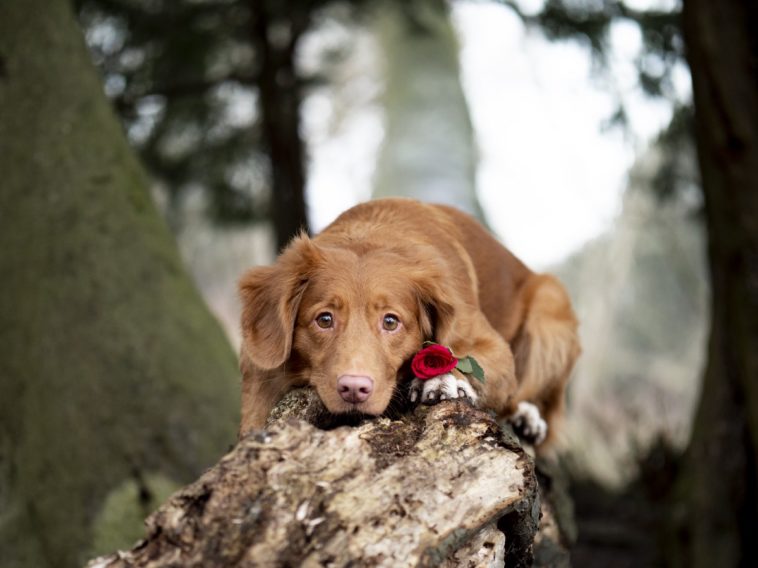h2>Dating : Falling in love with dogs.
Ever think that you might love your dog a little too much? Don’t worry, you’re not alone, and there’s a perfectly reasonable explanation.
A few years ago I was chatting to my sister over skype while we were both at work. She surprised me with a strange question,
“Do you think it’s possible to be in love with life?”
I didn’t know how to answer. There was an awkward cyber silence,
“Wait, what? Sorry I didn’t mean to say ‘life’”
Phew, didn’t sound like my sister, the cynic.
“I mean a dog. Do you think it’s possible to be in love with a dog?”
This wasn’t getting any better, but I wasn’t as shocked. We’d had family dogs since we were babies, we both knew all about loving dogs. But in love?
She nervously went on to describe how she felt possibly too strongly for her best friend’s dog, Mertyl, the beautiful Australian sheep dog, whom she saw every day. She was a fine dog; I also adored her, though I saw her much less. I reassured her that unless she thought about Mertyl in a sexual way, she didn’t need to worry, she just loved her in a normal, no therapy required way.
But I realise now that what she said wasn’t that crazy at all. Now that I have my own dog, Pepe, I’m confounded by how much I love him. And the feelings are shockingly similar to being in love:
- I miss him when we’re apart, even if it’s just a couple of hours.
- I talk about him constantly.
- I want to kiss and cuddle him endlessly.
- He makes me smile.
- Sometimes when I look at him, I feel my heart could burst.
- Most of my facebook posts feature him.
- I always want to be with him.
- I get a little giddy feeling when he does something extra cute. In fact, that happens when I just watch him sleeping too. Especially when he wags his tail as he dreams.
- It can feel a bit like infatuation.
The distinct lack of a sexual element sets this love apart from the intense romantic feelings we have for a member of our own species. Just having the word “dog” and “sexual” in the same sentence feels very wrong. However, the above sympoms are more in line with romantic love than family love. I love my sister, for example, but I wouldn’t smile to see her gazing adoringly into my eyes. That would be weird.
The feeling could have more in common with the love for one’s offspring, but I don’t have children of my own, so I can’t draw an accurate comparison there. I do know parents, however, who will attest that after the arrival of babies in the family, the dog remained a top priority and was always reminded that they were the original baby of the house. I can say that I feel a strong, maternal connection to Pepe and I probably baby him too much: when he snuggles up to me at night, it’s a motherly sensation that washes over me. My husband says that what he feels for Pepe is the desire to protect and nurture him. The word father comes to mind. We refer to each other as “mummy and daddy” when talking to him, for goodness sake!
The relationship I have with my dog is special, and my research reveals it to derive from a mixture of different types of love, which merge together and form something quite unique.
Firstly, we need to talk about Nagawawa’s (et al) study on oxytocin and the mutual gaze. When a mother and baby gaze at each other adoringly, the chemical oxytocin is produced, feeling each of them with love and warm fuzzy feelings. The tactile interaction increases the levels of oxytocin surging around the body and wrap mum and baby in a bubble of love. A long time ago, I read in a book about human and animal interactions, that stroking a dog releases the same amount of oxytocin as a mother breastfeeding her baby. I’d never breastfed a baby but I imagined it to be the most precious and intimate thing a woman can do. I was shocked to discover that I could reach the same level of nirvana just by stroking my beloved Labrador.
Oxytocin also increases the bond between two people in a romantic relationship, with levels rising significantly during kissing and touching, so it’s no surprise that I can’t walk past Pepe without stooping down to smooch the top of his head and stroke his soft ears. I press my forehead against his, inhaling his intoxicating dogginess, and I’m filled with enough positive charge to complete the task ahead. In much the same way, we draw strength from our romantic partner. A kiss on the forehead and a tight hug from my husband is often all I need to power on.
Apart from the obvious sexual element, the main difference between my feelings towards my dog and my husband is that if the latter were to express the same affection for all my female friends as the former, I wouldn’t find it so adorable. When Pepe flashes his wrinked nose grin and demands their undivided attention, I feel tremendously pleased that through him, I can bring others such joy. My husband jumping onto laps and pleading for butts rub would not be so cute.
Of course, it’s not only dogs that produce this effect. Petting any animal releases the “love hormone”, and I can confirm that burying my face into my cat’s fur, breathing in her lovely clean, cat smell and scratching her head as she purrs contentedly, brings me enormous calm and happiness. It’s just that, according to various studies, dogs seem to produce it by the bucket load, and our interaction with them sets off a perpetual cycle of oxytocin mutual production, which is unique to the dog/human relationship. We seem to feed off each other’s fuzzy feelings (or oxytocin levels) which in turn keep producing more. Studies show that cat/human interactions produce less oxytocin. Even wolves, dog’s closest relative, produced significantly less of the hormone during human handler interactions.
Oxytocin is not just about romantic “love” as presented in stories and poems though. It’s the chemical that is also released when experiencing acts of kindness and compassion, and which increases our trust and generosity. It is said to enhance our ability to feel empathy for others. Therefore, if dogs increase our oxytocin levels, when we’re around them we feel the same warmth and goodness as when someone has treated us- or we have treated another- with kindness and compassion. That is, we feel happy and again, that dreamy, giddy, “in love” sensation makes sense. It also helps that oxytocin has anti-inflammatory properties and can help to reduce pain. Dogs are beginning to sound quite magical.
In his book “Dog is Love. Why and How your dog Loves You”. Dr. Clive Wynne argues that dogs cannot help themselves; it is in their genes to be utterly and indiscriminatingly affectionate. But he insists that a dog’s love is not just reserved for humans: a dog will “fall in love”, as he puts it, with any species with which it is raised, and he has plenty of adorable data to confirm that dogs had no trouble bonding with the sheep and goats of his studies. An interesting detail of Dr. Wynne’s research is that dogs possess genes which, in humans, are associated with Williams-Beuren syndrome. Friendliness is one of the key traits of this syndrome. According to the National Organization for Rare Disorders, affected individuals present
“a friendly, outgoing, talkative manner of speech; a short attention span; and are easily distracted.”
Sound familiar? I mean, dogs don’t speak- at least not in a way that we understand- but if they could…
So dogs’ love genes make them want to hang out with, play with and dote upon any species with which they develop a bond; most commonly, humans. Most dog lovers will agree that there is nothing more delightful than seeing a dog bounding joyfully, tail wagging, nose twitching, simply loving life. They will instantly strike up a friendship with an unknown dog and commence play time, even if it’s only for a minute or so before their humans call them away. As a dog lover, I can’t help but feel charmed and privileged when a dog that’s not my own trots over to me, imploring my attention. Dogs’ capacity for expressing and transmitting joy is remarkable, and perhaps another reason for that giddy, loved up feeling they produce. Their happiness is contagious.
But it’s Paul Zak’s research that I find the most fascinating, as it reveals that rather than dogs being the ones to fall in love, they seem to be able to caste a love spell on everyone else. Zak took blood from a mixed breed terrier and a goat who regularly played together at an animal refuge in Arkansas. The dog’s oxytocin level increase of 48% showed that he was quite fond of the goat, clearly considering him a friend. However, the goat´s blood revealed a whopping 210% increase, which Zak concludes meant that
“the goat might have been in love with the dog”.
There are many theories about what love is, and scientists who want to deconstruct the emotions down to chemicals and biological reactions. But being such a personal, intimate and subjective phenomenon, who really has the authority to explain and prove what it is and what causes it? I do not believe that we simply love dogs because they release a feel good hormone into our bloodstream. I think that hormone is released because dogs have an almost otherworldly ability embody all the positive emotions that come together to create a feeling we know as “love”. Dogs seem to bring out the best in some humans- the ones who love them. They instil within us a sense of happiness and soften the edges of our complicated lives with their innocent simplicity and optimism. Sometimes a wagging tail is all it takes to lift me from a bad mood. Dogs have the ability to make us overlook their disgusting behaviour (eating human shit, rolling around on dead animals, sticking their noses in people’s crotches etc.) and just fill us with all the feelings that we experience when we’re in love.
So maybe my sister was onto something after all, and we really do fall in love with dogs. Maybe we shouldn’t try to squash such feelings into linguistic boxes: sometimes they’re too big and too complex to restrict with words. What I do know for sure is that I can’t help but steal glances at Pepe, as he snoozes just beyond my laptop, and smile.




